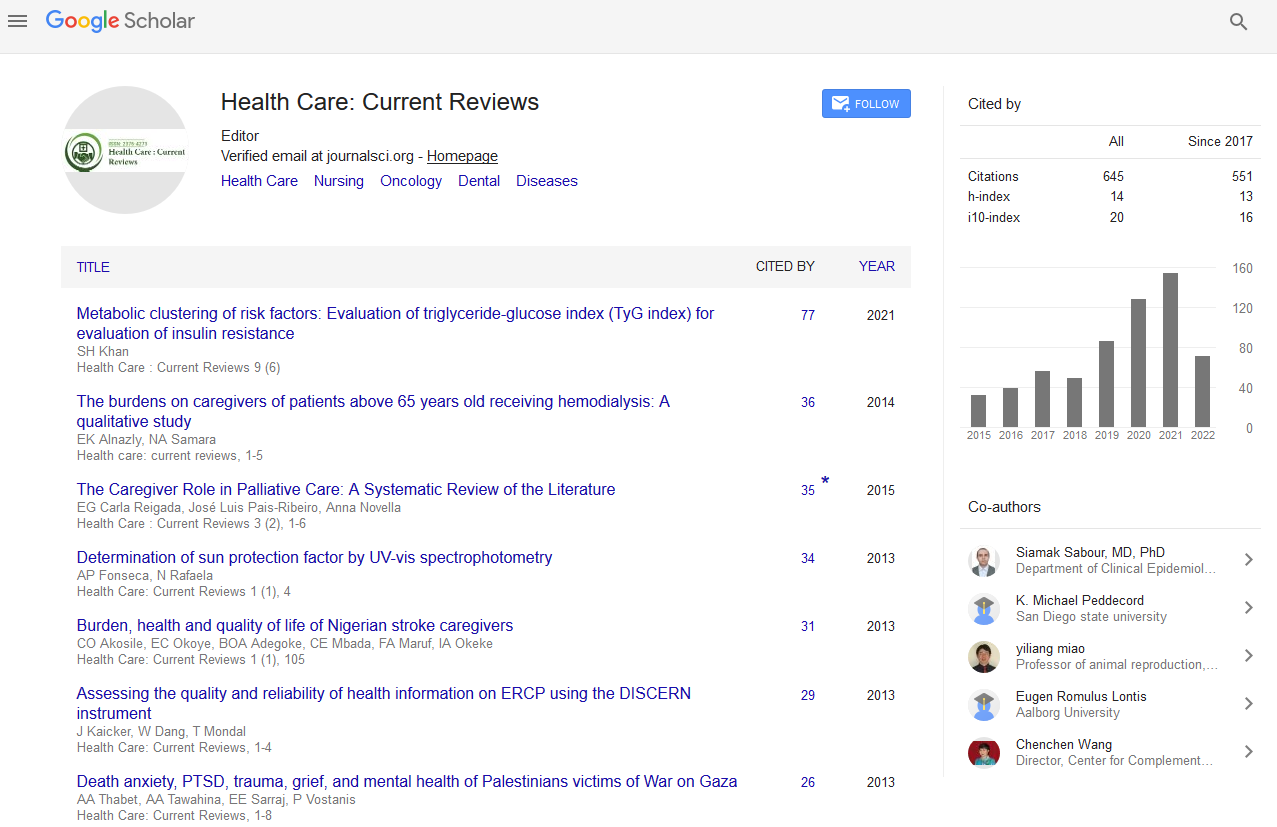PMC/PubMed Indexed Articles
Indexed In
- Open J Gate
- Academic Keys
- RefSeek
- Hamdard University
- EBSCO A-Z
- Publons
- Geneva Foundation for Medical Education and Research
- Google Scholar
Useful Links
Share This Page
Journal Flyer

Open Access Journals
- Agri and Aquaculture
- Biochemistry
- Bioinformatics & Systems Biology
- Business & Management
- Chemistry
- Clinical Sciences
- Engineering
- Food & Nutrition
- General Science
- Genetics & Molecular Biology
- Immunology & Microbiology
- Medical Sciences
- Neuroscience & Psychology
- Nursing & Health Care
- Pharmaceutical Sciences
Preliminary investigation to improve nursing students ability to provide holistic care
18th World Congress on Clinical Nursing & Practice
September 21-22, 2018|Prague, Czech Republic
Dale Hilty,Erin Dougherty,Kerry Fankhauser andScott Dolan
Ohio State University, USA
Posters & Accepted Abstracts: Health Care Current Reviews
Abstract:
In Waterman???s (2007) dissertation, nursing students emphasized Watson???s holistic carative exemplars of respect, knowledge, being responsible, considering outcomes of caring, competence, effective communication skills (active listening, openness), developing a trusting relationship, advocating, flexibility and assisting the patients to reach their highest level of wellness (meeting the patient???s needs, implementing health teaching). Two major areas of focus illustrated students not incorporating the exemplars in their clinical practice. First, the degree students demonstrating the carative exemplars can be observed during a senior precepted clinical rotation where faculty receives student handoff report about their patients. For example, students often repeat the unprofessional language (e.g. frequent flyer, diagnostic labels, drug seeker etc.) used by some staff nurses. This type of prejudicial language can result in objectification, which appears to influence nursing students??? indifference as opposed to kindness, separation vs. being present, and disengagement vs. engagement in caregiving. Second, students frequently focus on skills and task performances are inattentive to the holistic care of the patient. This lack of patient-centered focus can adversely impact the patient, leading to ineffective and worsening healthcare outcomes. The primary purpose was to explore the degree of compassion towards patients by junior and senior level nursing students. In the research investigation, the author selected six scales consisting of kindness, indifference, common humanity, separation, mindfulness, and disengagement. Forty seven (47) BSN nursing students answered Likert-type questions. Phase one of these quality improvements of educational intervention used a correlational analysis to determine the association among the six scales using a two-tailed hypothesis. The correlational findings revealed statistically significant positive associations among kindness, common humanity and mindfulness scales (ranging from 0.554 to 0.782) and negative relationships with indifference, separation and disengagement (-0.296 to -0.601). These scales can assist them in devising an intervention to increase the compliance with holistic and professional behaviors in clinical setting.
Biography :
Dale Hilty is an Associate Professor at the Mt. Carmel College of Nursing. He received his PhD degree in Counseling Psychology from the Department of Psychology at the Ohio State University. He has published articles in the areas of Psychology, Sociology and Religion. Between April 2017 and April 2018, his 10 research teams published 55 posters at local, state, regional, national and international nursing conferences.
E-mail: dhilty@mccn.edu


